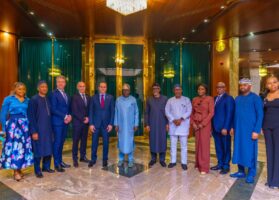Economists Joel Mokyr, Philippe Aghion, and Peter Howitt have been awarded the 2025 Nobel Prize in Economic Sciences for their influential research on how innovation and the forces of “creative destruction” shape long-term economic growth, the Royal Swedish Academy of Sciences announced on Monday.
The trio’s work provides a deeper understanding of how technological advancements spur new industries and processes while phasing out outdated ones—transformations that the Academy says are central to improved living standards worldwide. Their research illustrates how such cycles drive productivity, elevate quality of life, and form the basis of modern prosperity.
“Over the last two centuries, for the first time in history, the world has seen sustained economic growth. This has lifted vast numbers of people out of poverty and laid the foundation of our prosperity,” the Academy said in a statement.
Formally known as the Sveriges Riksbank Prize in Economic Sciences in Memory of Alfred Nobel, this year’s award is the final Nobel Prize announced for 2025 and comes with a monetary reward of 11 million Swedish crowns (approximately $1.2 million).
While celebrating the positive impact of innovation, the Nobel Committee also highlighted the importance of vigilance in maintaining growth.
“Economic stagnation, not growth, has been the norm for most of human history. Their work shows that we must be aware of, and counteract, threats to continued growth,” the Academy warned.
Mokyr, a historian and economic theorist based at Northwestern University in the United States, was awarded half of the prize. The remaining half was jointly shared by Aghion, who holds positions at Collège de France, INSEAD, and the London School of Economics, and Howitt, who is a professor at Brown University in the U.S.
The laureates’ individual contributions span both historical analysis and advanced economic modeling.
Read Also
“Joel Mokyr used historical observations to identify the factors necessary for sustained growth based on technological innovations,” said John Hassler, a member of the Nobel Committee.
“Philippe Aghion and Peter Howitt produced a mathematical model of creative destruction, an endless process in which new and better products replace the old.”
READ ALSO: Hungarian Novelist Krasznahorkai Wins 2025 Nobel Prize in Literature
During a press conference following the announcement, Philippe Aghion expressed surprise and gratitude.
“I did not expect it at all so I can’t find the words to express what I feel,” he said. “I am still speechless.”
Aghion also took the opportunity to advocate for economic reform in Europe, urging policymakers to adopt a more balanced approach between industrial strategy and market competition.
“In Europe, in the name of competition policy, we became very anti any form of industrial policy. I think we need to evolve on that and find ways to reconcile industrial policy in areas like defense, climate, AI, biotech, where we are very good, we have very good research there,” Aghion said.
He praised the U.S. and China, noting that they have “found ways to reconcile competition and industrial policy.”
The 2025 prize underscores the importance of innovation-led growth and serves as a reminder that economic progress is not guaranteed, but must be nurtured through thoughtful policy, investment in research, and resilience in the face of economic disruption.





